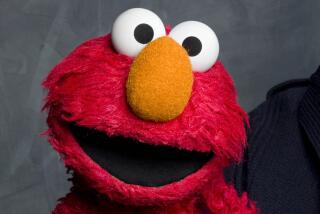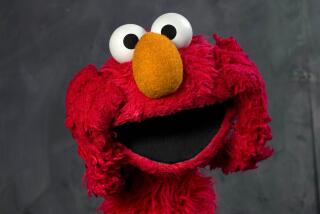Despite a move to HBO, ‘Sesame Street’s’ mission remains the same
Reporting from New York — Despite what the theme song might suggest, getting to “Sesame Street” is actually pretty simple — just a 20-minute subway ride from Manhattan to Kaufman Astoria studios in Queens.
At the nearly century-old facility — also home to “Orange Is the New Black” — cast and crew are filming a scene from the 47th season of the beloved children’s program.
Grover, as is often the case, is confused.
“No offense, Christopher, but I do not think it is a good idea to sit on a baby,” says the gangly blue Muppet, performed by Eric Jacobson, to his amiable (human) neighbor, Chris Robinson (Chris Knowings).
Standing next to a stroller outside Hooper’s Store, Chris calmly explains to Grover and his equally befuddled pal, Cookie Monster, that babysitting doesn’t literally mean sitting on a baby.
At the actor’s feet — and just out of the camera’s sights — Jacobson and three other puppeteers are contorted into what looks like a particularly intense game of Twister, their necks craned to check their performances via monitors on the floor.
As he has since the pilot episode in 1969, Frank Biondo — unofficially known as the “mayor of ‘Sesame Street’” — is operating the camera. In the corner is the equivalent of a body shop for Muppets, a workspace strewn with spare tongues and eyeballs and stacked with “resting” puppets. After a bungled take, a crew member mutters “mother of pearl!” under his breath; everyone on this set is conscious about keeping it clean.
In other words, it’s business as usual here at “Sesame Street,” despite a much-publicized move to HBO — a network better known for graphic beheadings, prodigious F-bombs and risqué sex scenes than wholesome kids’ programming — last season after nearly five decades as a public broadcasting staple.
In a deal announced in 2015, HBO secured the rights to “Sesame Street” for five seasons, with first-run episodes available on both the linear network and its standalone streaming service, HBO Now. (New episodes continue to air on PBS after a delay of several months.)
The move enabled the premium cable network to better compete with the likes of Amazon and Netflix, which have invested heavily in shows for tots reared on tablets and smartphones. By adding “Sesame Street,” a cherished cultural institution, to a roster that includes Emmy winners such as “Game of Thrones” and “Veep,” HBO also further burnished its prestigious brand.
For Sesame Workshop, the nonprofit organization that produces “Sesame Street,” the partnership eased financial pressures hastened by declining revenue from DVD sales.
Given that President Trump’s proposed budget, released last week, calls for the elimination of the Corporation for Public Broadcasting — from which “Sesame Street” once derived a portion of its funding — the move also seems prescient. While the current incarnation of “Sesame Street” does not receive funding directly from the CPB, many of the PBS stations that continue to carry the program, thereby making it available for free, do. Strictly from a business perspective, the deal was an obvious win-win for both parties, particularly given HBO’s reputation for creative noninterference.
“They really trust us because we’ve been doing this for almost 50 years,” says Brown Johnson, executive vice president and creative director of Sesame Workshop. “They feel like we’re the experts. We don’t even show them scripts or rough cuts or excerpts.”
HBO has also been pleased with the collaboration. “What’s been exciting about the partnership with Sesame Workshop is that they’re not only deeply talented creative producers but also remarkably rigorous educators with a very unique commitment to engagement on and off the screen,” says Lisa Heller, the network’s senior vice president of family and documentary programming.
Still, the news sparked a vocal outcry. Many bemoaned the fact that children with parents wealthy enough to afford an HBO subscription would now get first dibs on an educational program that was designed to reach low-income families and that has been shown to improve school readiness, particularly among economically disadvantaged kids.
While “Sesame Street” hasn’t been completely gentrified, there have been some substantial changes. Episodes are now 30 minutes long, instead of an hour, and the expansive cast of Muppets has been winnowed to focus on a core group of six characters: Big Bird, Elmo, Abby Cadabby, Grover, Cookie Monster and Oscar the Grouch.
Bert and Ernie fans needn’t fret — other characters still pop up from time to time, and a new Muppet character is also on the way.
As announced Sunday, a little redheaded girl with autism named Julia will come to “Sesame Street” April 10. Longtime writer Christine Ferraro told “60 Minutes” that the character was part of the show’s mission of inclusion and reflected the rise in autism diagnoses in recent years. Julia is operated by puppeteer Stacey Gordon, who has a child with autism.
The once-gritty brownstone set has also gotten an upgrade befitting post-Bloomberg New York City, complete with a vibrant urban garden, a community center and a shared roof deck. Oscar the Grouch is as malcontent as ever, but lives next door to a recycling bin. Even Hooper’s Store has been remade with a fashionably retro look — pressed tin ceilings and a neon sign — and sells soy milk and highbrow magazines. (The racks include a New Yorker knockoff called Your Borough.)
This season, which began in January, has brought further modifications. The recurring “Elmo’s World” segment is back, but is now five minutes long, and includes a new character, Smartie, an animated cellphone that helps Elmo look up information online.
“There’s a pressure on any iconic program like ’60 Minutes’ or ‘SNL,’ to keep it fresh and keep up with the times,” Johnson says. “We have to be aware of what’s going on in the world.”
This is all the more critical given the sheer volume of programming available to today’s preschoolers.
“When ‘Sesame Street’ first started, there was ‘Mister Rogers Neighborhood’ and ‘Captain Kangaroo.’ Now there are 600 shows, and they’re good. It’s not like there’s a lot of junk out there,” Johnson says.
But staying current can be especially fraught for a kids’ show viewed with such affection by so many. Many now-grown fans consider “Sesame Street” sacrosanct and view any change, however slight, as nothing less than a betrayal of their childhood memories.
When news broke in August that longtime cast members Bob McGrath, Emilio Delgado and Roscoe Orman (who played Bob, Luis and Gordon, respectively) had been let go, the virtual outcry was so intense that Sesame Workshop’s chief executive, Jeff Dunn, issued an apology on Facebook about how the actors were informed.
Despite the face-lift, the goal for “Sesame Street” remains what it’s always been, according to Johnson — to make “the best show we possibly can with really nutritious content that’s going to help kids navigate life.”
In a sign of its enduring appeal, the show continues to be a magnet for celebrities. Tony-winning “Hamilton” star Daveed Diggs stopped by earlier this season to perform a rap version of “Rubber Duckie,” while future episodes will feature appearances by “Selma” actor Anthony Mackie and “The Late Late Show” host James Corden.”
Cameos like these tend to be more satisfying for parents, but the ultimate arbiters are, as ever, the kids, Johnson says.
“I always say that 3-year-olds tell me how to do my job.”
See the most-read stories in Entertainment this hour »
‘Sesame Street’
Where: HBO
When: 9 a.m. Saturday
Rating: TV-Y (suitable for young children)
Follow me @MeredithBlake
More to Read
The complete guide to home viewing
Get Screen Gab for everything about the TV shows and streaming movies everyone’s talking about.
You may occasionally receive promotional content from the Los Angeles Times.






